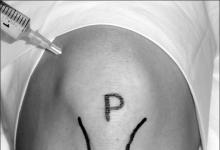Hot Stuff Part II: Current Status and Recommendations on Vaccines and Biologics Save

Read Part I here.
Dr. Clifton Bingham - Current Status and Recommendations on Vaccines and Biologics
Dr. Bingham reviewed vaccination and its use in rheumatology. Vaccination is a unique and often forgone opportunity to avert risks imposed by disease or therapies. Rheumatologists are in the privileged position of educating patients and collaborating clinicians on which patients should receive which vaccines and when. He recommended that physicians take an immunization history before embarking on a treatment plan. Equally important is the delegation of responsibility; who is going to manage immunizations in the patient who will be treated with DMARDs and immunosuppressives – is this the role of the rheumatologist or primary care physician. Some of the take-home messages from Dr. Bingham’s address include:
-
While there are many vaccines, they differ in preparation and whether these can be given to patients receiving recombinant biologic agents.
-
Killed inactivated vaccines include the tetanus preparations (Td, TDAP), hepatitis A and hepatitis B vaccines, influenza, HPV, pneumococcal conjugate (PCV7, PCV13 – Prevnar).
-
Live/attenuated vaccines include: H. zoster, MMR, yellow fever, oral typhoid oral, rotavirus, BCG, polio (OPV), most Dengue vaccines in development, and many rabies vaccines outside the USA.
-
Polysaccharide (T cell independent) vaccines include; pneumococcal (PPSV23 Pneumovax), meningococcal vaccine and Typhoid IV vaccine.
-
Caution over live vaccines arises with the potential for disseminated infection. These rare events only occur in immunocompromised patient. For example, in varicella vaccination in children immunosuppressed because of chemotherapy, organ transplantation or HIV infected individuals exposed to live virus.
-
Live virus may be shed for up to 3 weeks. Live influenza virus is shed - 80% shed > 1 strain for 7.6 days in one study).
-
MMR in JIA is another example of a live virus. In a study, MMR was given to children with JIA (juvenile arthritis) treated with MTX or etanercept, and no viral infection or worsening of arthritis was seen. This is not a guidance or recommendation. It seems likely that this was a booster immunization and disseminated viral infection or worsening of arthritis is very unlikely.
-
There is an important difference between anamnestic (booster) vaccinations and neoimmunization.
-
Neoimmunization with live virus poses a much greater risk.
-
Examples of neoimmunization include the use of vaccines for Yellow fever in adults or rotavirus or BCG in newborns.
-
Yellow fever vaccination was given to 15 pts on infliximab. In all patients this was a booster vaccine. Infliximab did not affect responses and no untoward reactions were observed.
-
-
Multiple studies show that with conventional methotrexate use there is a substantially reduced response to protein and polysaccharide antigens - by as much as 50%! Hence it is best to vaccinate before methotrexate initiation.
-
Hydroxychloroquine shows no impairment of response to influenza vaccination.
-
There is limited data on vaccine responses with the use of leflunomide or sulfasalazine.
-
Azathioprine, mycophenolate and cyclosporine may have reduced but protective responses to immunization.
-
-
TNF inhibitors: studies have yielded variable results for vaccination against influenza, pneumococcus or hepatitis B. In general, immune responses are reduced, but protective. Most agree immunizations should be given to those on TNF inhibitors. Although live virus vaccines should not be given to those on TNF inhibitors, the observations of no infection or dissemination when exposed to the H. zoster vaccine suggests that such “booster” response to live virus vaccines can be safe (see Curtis J, JAMA 2012).
-
Abatacept (ABA): vaccine responses are reduced but protective in most.
-
There is a significant reduction with neoantigen immunization.
-
Best to vaccine before ABA initiation, especially before neoimmunization.
-
ABA patients vaccinated with pneumococcus (PPSV-23) and influenza: up to three-quarters will develop protective titers.
-
-
Rituximab (RTX): reduced responses to primary and secondary immunizations.
-
SIERRA study examined tetanus toxoid, Candida, 23 valent pneumococcus, KLH (neo antigen) in patients receiving either RTX+MTX versus MTX alone. RTX treated patients have comparable recall response to tetanus toxoid and preserved delayed type hypersensitivity responses were seen. However, polysaccharide (PPSV-23) and neoantigen responses are reduced. If possible, pneumococcal polysaccharide vaccine and new (as opposed to booster) immunizations should be given prior to initiating RTX to maximize responses.
-
-
Belimumab: lupus patients maintained titers while on Belimumab, no change in Ab levels from baseline. Vaccination before belimumab is advised.
-
Tocilizumab (TCZ): The VISARA study examined responses to tetanus and 23V pneumococcal vaccines. Those on TCZ had a nonsignificant decrease in Ab titers to PPSV-23, no reductions with tetanus toxoid. An insufficient vaccine response was seen in those on MTX alone.
-
Tofacitinib (TOFA): 2 studies have recently showed suboptimal responses to PPSV23 (45% vs. 68%) and influenza (56.9% vs. 62%) vaccines. Patients on TOFA monotherapy had a less blunted effect. The combo of MTX and TOFA had reductions
-
ORAL Sequel study: holding TOFA helps with the mounting of responses to pneumococcus, but influenza.
-
-
Good overview written by Dr. Bingham can be found at Arthritis Res Ther 2014 16: 506.
-
Dr. Bingham recommends that clinicians use the CDC.gov site for guidance on vaccines in patients who are immunosuppressed. http://www.cdc.gov/vaccines/pubs/vis/default.htm
- Conjugated Pneumococcal vaccine PCV13 – adults at risk should receive PCV13 at their next opportunity. If this is their first – they should receive PCV-13, followed by PPSV23 8 weeks later. A booster w/ PPSV23 can be given every 5 years. If they have previously received PPSV23, give PCV-13 and give the PPSV23 every 5 years.









If you are a health practitioner, you may Login/Register to comment.
Due to the nature of these comment forums, only health practitioners are allowed to comment at this time.